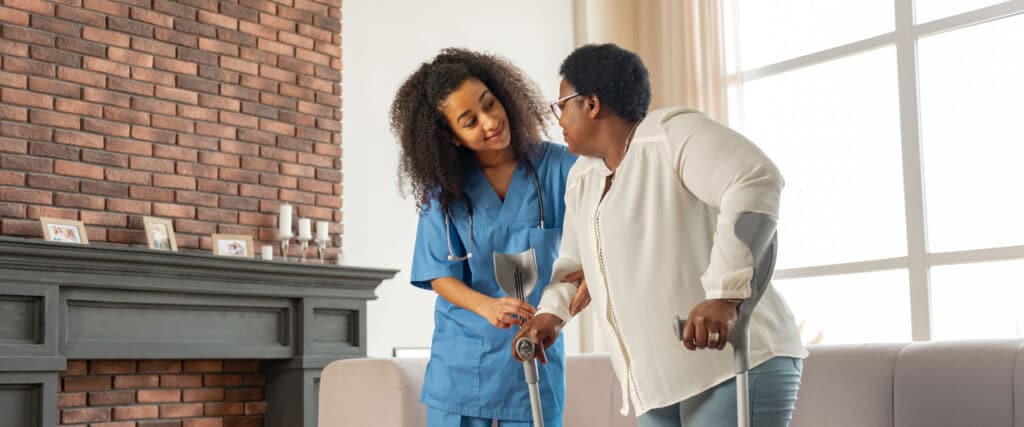How to Help Your Elderly Loved One Who is Prone to Falling
One of the most significant risks for the elderly population is experiencing a fall. Unfortunately, not only is falling a scary experience, but it can also leave older adults with significant health issues. The CDC reports about 36 million falls are reported among the elderly population every year, leading to 3 million emergency room visits and 32,000 deaths. While falls are common, they can be prevented with some close monitoring, lifestyle adjustments, and a well-rounded approach to keeping your loved one healthy. In this blog, we’ll discuss elderly fall prevention more and how you can do your part to prevent your loved one from falling.
Why do Elderly fall More
According to the National Institute on Aging, older adults are more prone to falling because of many different factors, many of which are health-related. As adults age, health conditions can rapidly change, leaving them at risk for experiencing a fall. Specific health-related risk factors for falling in the elderly population include:
- Decreased cognitive impairment, including various types of dementia
- Loss of muscle mass directly relating to age
- Problems with gait or losing balance while walking
- Blood pressure that drops when standing
- Specific health problems, including vertigo, diabetes, osteoporosis, heart disease, or issues with the thyroid, feet, nerves, and blood vessels
- Foot problems that cause pain
- Previous history of falling
- Use of canes, walkers, and other assistive devices
- Medications with side effects of confusion or dizziness
Risks of Falling
While age-related health conditions can cause a significant risk of falling in elderly adults, there are also many environmental risk factors, such as:
- Cluttered environments with tripping hazards, such as stairs or rugs
- Poorly-lit environments
- Wearing unsafe footwear
- Slippery floors
- Pets
- Unstable furniture
- Sidewalk cracks
- Snowy or icy walkways
These are just a few risk factors in surrounding environments that can cause a fall in elderly adults. Unfortunately, many risk factors may cause an older adult to fall, so it’s essential to eliminate and reduce any risks as much as possible.
Fall Prevention Tips
Luckily, some prevention can go a long way in preventing falls in our elderly loved ones. First, start by assessing their living conditions and make any adjustments needed. Here are just a few safety tips for their environment:
- Add grab bar to bathroom areas around toilets, showers, and bathtubs
- Install handrails on both sides of stairs
- Repair cracks and uneven surfaces in walkways
- Remove any electrical cords on walking surfaces
- Install nightlights in hallways, bathrooms, stairways, and bedrooms
- Remove or tack down throw rugs
- Avoid waxing floors
- Place non-skid surfaces in the bathroom
How To Encourage Your Loved One To Prevent Falls
If you think your loved one is at risk for falling, it may be time to have an open conversation with them about their health and environment. They are likely aware they may be at risk of falling and have an idea of what to do to take care of themselves. Here are a few suggestions you can make to your loved one to reduce their risk of falling:
- Encourage them to keep up with their physician’s appointments, including vision and hearing screenings
- Have them address any foot pains with a podiatrist, including nail issues or corns
- Watch for any signs of dizziness, feelings of unsteadiness on their feet, or signs of confusion
- Have them report any medication side effects, such as dizziness, to their doctor
- If a doctor has told them to use a walking aide, encourage them to use it
- Encourage them to eat well and exercise
- Encourage them to limit their alcohol intake
Reviewing safety protocols and elderly fall prevention measures with your loved one can help to keep them safe.
Dignity Home Health & Hospice’s Fall Prevention & Balance Program
At Dignity Home Health & Hospice, we understand that your loved ones may need help staying safe in their environment. Our fall prevention and balance program provides assistance with keeping your loved one safe. It encourages them to tackle any root problems with stability, empowering them to stay strong and active.
Why Physical Therapy Is Important To Keep Your Loved One Safe
Our Fall Prevention & Balance Program includes an in-depth analysis from physical therapists to determine what could be contributing to your loved one’s loss of balance and coordination. Afterward, they apply evidence-based practices to achieve high-quality care that will be effective. Fall prevention exercises are often incorporated to help your loved one build momentum in their abilities, strengthen core muscles, and improve reflexes. We’ll also include a site assessment to determine any immediate risks that need to be remedied in your loved one’s environment.
What is the best part of our fall prevention for elderly adults at Dignity? It is completed in the safety and comfort of your loved one’s home, so there is no need to travel for physical therapy services.
Using Dignity Keeps Your Loved One Safe and Gives You Peace of Mind
Observing changes in your loved one can be challenging, and you may not know where you turn. If you are concerned about your loved one’s safety, Dignity Home Health & Hospice understands. We are committed to providing exceptional care for every patient, no matter the stage of life. Our entire team, including our physical therapists, provides thorough, intensive services to ensure your loved one gets the attention and therapy they deserve. Whether your loved one needs elderly fall prevention or recovery services, we’re here to provide Utah’s best home health services. Contact Dignity Home Health & Hospice today to learn more about our services.


